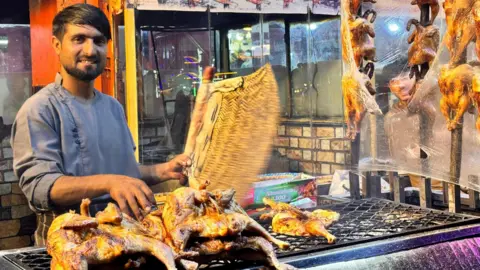Afghans rejoice as internet returns after Taliban blackout
19 minutes agoDearbail Jordan,Hafizullah MaroofBBC Afghan andCaroline Daviesin Islamabad

 EPA
EPAAfghans have taken to the streets to rejoice in the restoration of internet and telecom services after the Taliban government shut them down, provoking widespread condemnation.
Local reporters said communications were resuming, while internet monitor Netblocks said network data showed a “partial restoration” of connectivity.
A source close to the government confirmed to BBC Afghan that the internet was back by order of the Taliban prime minister.
The 48-hour blackout disrupted businesses and flights, limited access to emergency services and raised fears about further isolating women and girls whose rights have been severely eroded since the hardline Islamist group swept back to power in 2021.
On Wednesday evening hundreds of Afghans took the streets in the capital city Kabul to spread the word that the internet was back.
One man told BBC Afghan: “Everyone is happy, holding their cell phones and talking to their relatives.
“From women, to men and Talibs [a member of the Taliban], each was talking on phones after services were restored. There are more crowds now in the city.”
Suhail Shaheen, a senior Taliban spokesman in Qatar, said “all communications” were restored by Wednesday afternoon.
The Taliban government has not given an official explanation for the shutdown.


However, last month, a spokesperson for the Taliban governor in the northern province of Balkh said internet access was being blocked “for the prevention of vices”.
Since returning to power, the Taliban have imposed numerous restrictions in accordance with their interpretation of Islamic Sharia law.
Afghan women have told the BBC that the internet was a lifeline to the outside world since the Taliban banned girls over the age of 12 from receiving an education.
Women’s job options have also been severely restricted and in September, books written by women were removed from universities.
Following the internet shutdown on Monday, the UN said it left Afghanistan almost completely cut off from the outside world.
It added that the blackout risked “inflicting significant harm on the Afghan people, including by threatening economic stability and exacerbating one of the world’s worst humanitarian crises”.
During the blackout, the BBC was told that the centre of Kabul was noticeably quieter, with banks closed and shopping centres near empty.
In the money exchange market, all international transfers had been stopped – meaning vital money, often from family members abroad, could not enter Afghanistan.
Afghans living outside the country phoned in to a BBC Afghan radio show in the hopes their messages reached family members still there.
Travel agents were either closed or only partially open to provide customers with information. Flights in and out of the country were cancelled.
“This is the gradual death,” one shopkeeper told us. “When there is no hope, no chances of progress, no freedom of speech, no optimism for the future of your child, no stability for your business, where you can’t benefit from your studies.”
But on Wednesday, the mood lifted when people could use the internet and call each other again.
Delivery driver Sohrab Ahmadi said: “It’s like Eid al-Adha; it’s like preparing to go for prayer.
“We are very happy from the bottom of our hearts.”
Mah, a 24-year-old who fled Afghanistan in 2021 and is now getting an education in the UK, said she was in tears when she could finally speak to her family, who remain there.
“When I spoke to my mum, I cried, I was happy,” she said. “At least I can hear her voice.”
She added: “You don’t know what’s going to happen next in Afghanistan because nothings under control.”